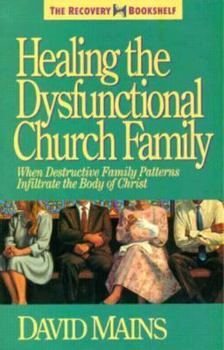Healing the Dysfunctional Church Family
No church is perfect, just as no family is perfect. This profound and honest book calls us to accept the church's humanness as it explores common dysfunctions. But it also calls upon us to view each... This description may be from another edition of this product.
Format:Paperback
Language:English
ISBN:0896930505
ISBN13:9780896930506
Release Date:January 1992
Publisher:Victor
Length:156 Pages
Weight:0.50 lbs.
Dimensions:0.4" x 5.5" x 8.5"
Customer Reviews
1 rating
Helpful in Understanding People Dynamics in the Church
Published by Thriftbooks.com User , 20 years ago
Although Dr. Mains did a good job exposing the patterns of family dysfunction in a church setting, he did not provide practical suggestions on how to counter the various dysfunctions mentioned in his book. Mains shared a `helpful prayer' to break the habit of "blaming and shaming," but most people were unaware of their behavioral pattern. For leaders to suggest that a church member prayed a particular prayer will only make the person defensive. Mains never said how a church leader could promote change in this area of a person's life.Based on Dr. Mains' vague descriptions for compulsive/addictive personalities, it would be nearly impossible to positively identify someone with this trait. He provided these characteristics: habitually sitting in the same pew during services, trying to "control" a business meeting, constant tardiness, and chronically "bad-mouthing" others, however these "symptoms" may not necessitate a compulsive/addictive trait. It was possible that these descriptions indicated that the person was disorganized and was in need of time management training, or the person was just obnoxious and lacked basic manners. Perhaps the "bad-mouthing" individual was simply seeking attention or venting frustration.In the chapter, "Love That Has to Be Earned," Dr. Mains listed types of people he found difficult to show "Christ-like love." His inventory contained vindictive, disloyal, unappreciative or untrustworthy people, and those who have "never-ending needs" (19). His recommendation was for congregations to express "unconditional love" for each other. This was unrealistic, and his supposition that churches become "dysfunctional" because they failed to emulate God's unconditional love was harsh. He failed to realize that this ideal church would never exist here on Earth because the church is full of sinners. David A. Seamands contributed a deeper meaning of "perfectionism." He pointed out that perfectionists possess a "combination of pride and low self-esteem." They were fearful people will reject them if it was "discovered" that a disparity existed between their "real selves" and "fantasy selves" (119). They had low self-esteem because they "put themselves down" before others can, which protected their false pride.Mains included another writing from David A. Seamands in the "Living in Denial and Delusion" chapter. What Seamands described was comparable to split personality-- when painful childhood memories were repressed (not allowed to be expressed), the emotions "disguised themselves and tried to smuggle into our personalities through another door" (79). He said that if the "buried memories" were released due to "physical exhaustion, illness, or traumatic shock," then the "dormant child" will "take over" a person's attitudes, reactions and behavior. The emotions will be expressed as "deep depression, rage, uncontrollable lust, fear or inferiority (80)." He likened this repression to someone who was put into "deep freeze"--the b






